News
2019 presidential election: How it all unfolded
View(s):The 2019 presidential election ended in a resounding victory for the Sri Lanka Podujana Peramuna presidential candidate Gotabaya Rajapaksa as he won the presidency with a final vote count of 6,924,255, an overall percentage of 52.25 percent of the total vote. New Democratic Front candidate Sajith Premadasa came a distant second with 5,564,239 votes, giving him a 41.99 percent share of the total vote.
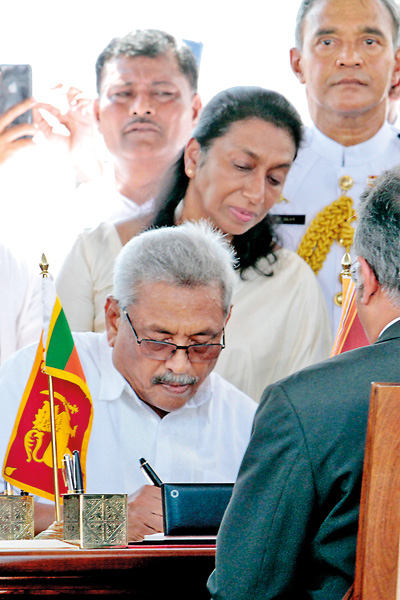
President Gotabaya Rajapaksa being sworn in at Ruvanweliseya on Monday. Pix by Indika Handuwala and Amila Gamage
The National Movement for People’s Power candidate Anura Kumara Dissanayake, who some believed would be a strong third force, polled just 418, 553 votes, a total share of 3.15 percent.
The gulf between the two main candidates was such that all 33 other candidates who contested the election lost their election deposits.
Nearly 84 percent of registered voters exercised their franchise at the election.
Both local and foreign election monitors hailed the presidential poll as a peaceful, free and fair election, though they highlighted several areas of concern.
The European Union Election Observation Mission (EU-EOM) said that the election was largely free of violence and technically well-managed, but that unregulated campaign spending, abuse of state resources and media bias affected the level playing field.
“While the campaign on the ground was largely peaceful and calm, the playing field in the traditional and online media was affected by the misuse of state resources by both front runners and the absence of campaign finance regulations,” Chief Observer Marisa Matias told journalists while presenting the mission’s preliminary statement in Colombo.
Meanwhile, Prosper Bani, Chair of the Commonwealth Observer Group also highlighted the need for mechanisms to regulate campaign finances “in order to ensure transparency, accountability and an even playing field.”
He noted that another issue of concern was the use and promotion of hate speech through private media, as well as on social media platforms, including during the silent period after all campaigning had ended.
Gotabaya Rajapaksa was sworn in as the country’s 7th Executive President before Chief Justice Jayantha Jayasuriya at the Ruvanweliseya in Anuradhapura on Monday (18). The new president took oaths on a special stage set up adjacent to the statue of King Dutugemunu.
Meanwhile, Gotabaya Rajapaksa’s brother and former president Mahinda Rajapaksa was sworn in as Prime Minister on Thursday (21) at the Presidential Secretariat. He was sworn in after Ranil Wickremesinghe resigned from the post of Prime Minister the previous day.
With the Prime Minister now installed, President Rajapaksa swore in a 16 member interim Cabinet on Friday (22). The Cabinet will be in place until the next parliamentary elections, which is likely to be declared after March 1 next year when the president will be constitutionally empowered to dissolve parliament after the completion of 4 1/2 years of its term.
State ministers of the new government are due to take oaths tomorrow (25).
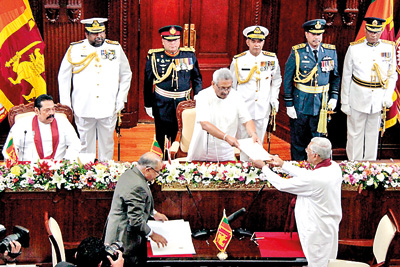
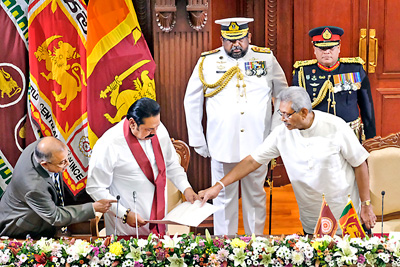
New cabinet: Brothers Mahinda Rajapaksa and Chamal Rajapaksa being sworn in on Friday
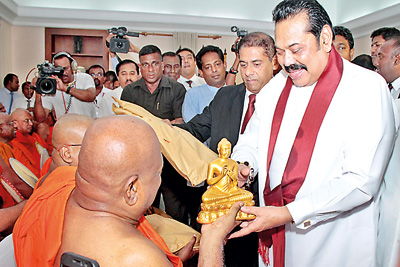
Mahinda Rajapaksa assuming duties as Prime Minister
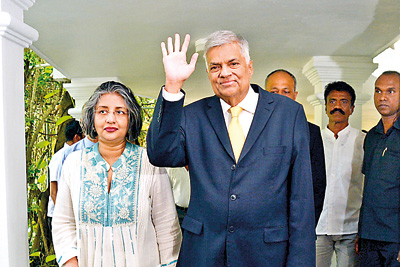
Former PM Ranil Wickremesinghe and wife Maitree leaving Temple Trees

